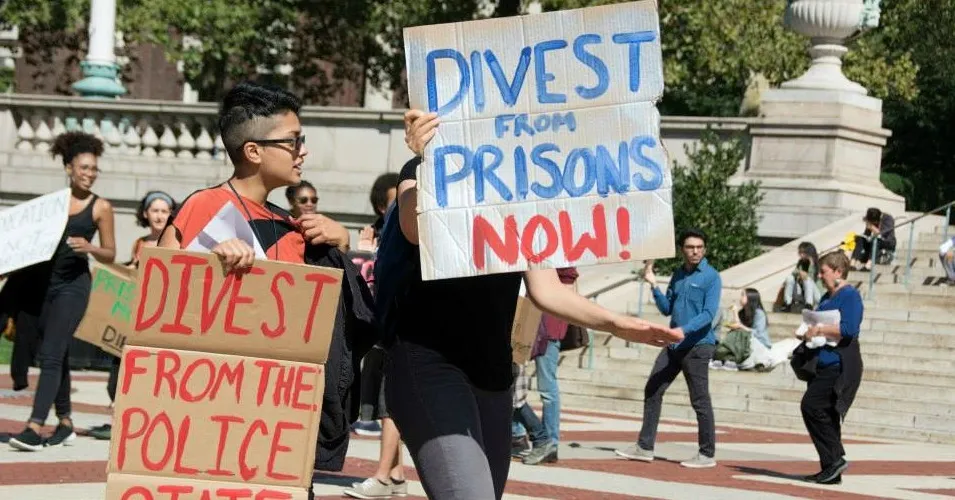Table of Contents
We don’t listen. We try to firebomb right-wing rhetoric at Stanford students rather than taking a more nuanced position. We are conservative crybabies.
Stanford’s more vocal Review-haters don’t hesitate to hurl abuse in our direction whenever we register an opinion on literally anything -- from ethnic theme dorms, to a humanities core, to the Paris Climate Accords. In their eyes, we are one-sided and exclude every viewpoint that could possibly disagree with ours.
So what happened when two Review members arrived at an open meeting on prison divestment, to listen and learn and contribute our own perspectives?
We were thrown out.
Last week, a group called Students for the Liberation of All People (SLAP) sent an email to campus mailing lists with the subject line “Call to Action! Stanford continues to support mass incarceration.” SLAP’s letter called for the managers of Stanford’s endowment to stop investing in private prisons, companies that invest in private prisons, or companies that provide services to or benefit from the labor of private prisons.
Private prisons are nationally controversial. They appear in newspapers almost daily. Their role in perpetuating mass incarceration, as well as the lack of evidence that they are cheaper than governmental prisons, have earned them many critics – from the left and the right. They are as close to a textbook open political issue as can exist.
I was curious to learn more about the issue. So on Wednesday, I walked into a SLAP meeting at the Nitery with a fellow editor. We sat down and prepared to listen.
This didn’t last for long. Before long, someone in the room recognized my fellow editor as a member of the Review and told him to leave the room.
He explained that he was there out of curiosity. Two nights before, the Review had heatedly discussed private prisons. Editors and writers were deeply conflicted on whether SLAP and SU Prison Divest's missions were worthwhile. Many Review members argued against the prison industrial complex and agreed with the divestment movement. On the economic and symbolic value of divestment, the debate had ended, as many Review conversations end, with no clear verdict.
“This is not a safe space for you,” one leader unambiguously replied.
As soon as he left the room, the leaders went on to discuss how inclusive the group would be. If any person in the room disagreed with a proposed group decision, the decision would be immediately vetoed.
But apparently, if you dared to write for a newspaper advocating for such horrifying things as mandatory study of Plato, you weren’t worthy of inclusion.
After my fellow editor was expelled, I decided to stay in the room. Since I had no plans to speak in the meeting or to publish anything negative about the organization, I assumed that my presence would be tolerated.
Not so. After my fellow editor left, leaders asked me if I was a journalist. I avoided the question by responding that I study computer science (which is true). Unsatisfied, they proceeded to Google my name. As soon as they saw my name as an editor on the Stanford Review website, a chorus of voices demanded that I leave the meeting.
Though the meeting was fairly secret, it was not restricted to members of the organization. The email had stated the meeting was open to anyone interested in joining. And we were not kicked out for being journalists per se. Another student who explained that she wrote for STATIC, a left-wing activist publication, was welcomed into the meeting with approving nods.
Instead, we were expelled because of our beliefs.
Like everyone else in the room, I believe in spaces where anyone -- regardless of race, gender, or political affiliations -- should feel safe to express their views. And I respect the organization’s right to ask disrespectful or malicious members to leave a meeting.
But this was not a community center or peer counseling session where participants deserve to be affirmed; this was a political meeting designed to organize against the university. Even though the meeting was not publicized, alternative viewpoints should not have been silenced.
And despite being members of the Review, my fellow editor and I have never published anything negative about campus activist movements. In fact, I’ve written positive reviews of activist events. We don’t even identify as “conservative.”
Students for the Liberation of All People’s characterization of a “safe space” was laughably exclusive. It’s clear that their safe space tolerates only those who would not think about challenging the group norm.
If activist groups such as SLAP want to truly be “inclusive”and gain widespread support for the causes they care about, they should appeal to politically moderate or apathetic students and avoid alienating those on the other side. Campus activists tend to espouse causes--such as promoting racial equality, ending mass incarceration, and opposing fossil fuels--that naturally evoke sympathy in Stanford students. However, listening only to other radical students who completely agree will only alienate moderates and provoke defensive responses from conservatives.
In my three and a half years at Stanford as a female student of color, this was by far the least safe I have felt in a room. I walked into the meeting hoping to gain a greater understanding and appreciation for activist groups, and walked out determined to publish this article.
Correction: An earlier version of this article incorrectly referred to the student group as SU Prison Divest. SLAP is a new student group that aims to build on SU Prison Divest's earlier work on prison divestment advocacy.





